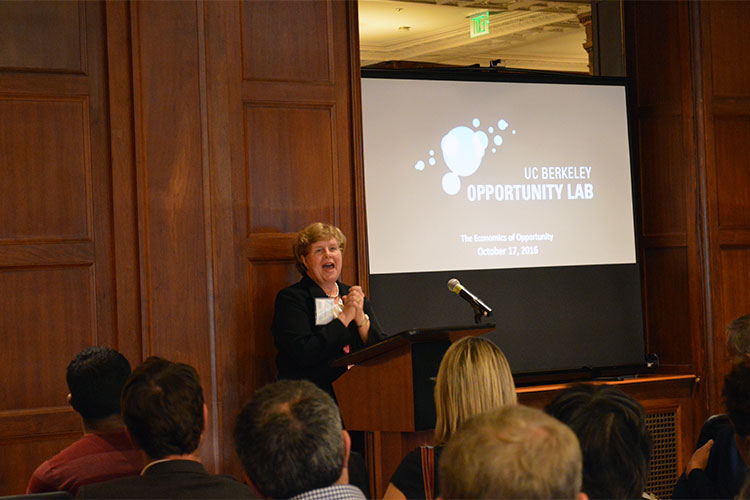New Opportunity Lab to focus on policy for poverty, inequality
Berkeley economist Christina Romer thinks new Opportunity Lab's "good, policy-oriented research” can help solve current political dysfunction.

October 19, 2016
If anything can save the country from its current political dysfunction, it is “good, policy-oriented research,” Christina Romer, a UC Berkeley economist and former chair of the White House Council of Economic Advisers, said Monday.
The remarks came during Romer’s keynote address to a gathering at the Bently Reserve, formerly the Federal Reserve Bank of San Francisco, to officially launch UC Berkeley’s Opportunity Lab.
O-Lab is a new, interdisciplinary research network at UC Berkeley established to sustain and build on the campus’s tradition of producing influential, cutting-edge economic investigation of public policy issues — particularly around growing poverty and inequality in the United States and beyond.

Economist Christina Romer says the type of evidence-based research supported and promoted by O-Lab is critical to help determine the scope of today’s pressing problems. (iStock image.)
Romer served on the White House council for two years in the wake of the unnerving national financial meltdown of the Great Recession. She said the type of evidence-based research supported and promoted by O-Lab is critical to helping determine the scope of pressing problems with health care, criminal justice, wages, equitable tax systems and the changing nature of employment, as well as staking out practical frameworks to develop consensus for solutions with maximum impact.
While Romer said she is “as depressed as anyone” by the chaotic negativity of the 2016 presidential campaign, she said O-Lab’s prospects to make a difference make her hopeful.
Edward Miguel, a UC Berkeley economist and co-director of the Opportunity Lab, said lab researchers include economists such as Emmanuel Saez, who has become almost a household name for his data-driven exploration of a growing accumulation of wealth in the hands of a few.
“Berkeley is really the worldwide center for rigorous, empirical research on inequality and opportunity, but that isn’t as widely known as it should be,” said Jesse Rothstein, a UC Berkeley professor of public policy and economics and O-Lab co-director.
He said the lab will create an institutional home for that work that spans all of the silos at Berkeley — departments, colleges and disciplines — and will help to get the word out about the important role that Berkeley scholars play on this important topic.
UC Berkeley economist David Card, generally considered a contender for the Nobel Prize in economics someday, also spoke, sharing his research findings that a flawed screening process often overlooks high-achieving minority and low-income students who qualify for gifted and talented education programs.
Enrico Moretti, author of the award-winning book The New Geography of Jobs, outlined his investigation of what makes some American cities and metropolitan regions outperform others in terms of job creation, innovation, life expectancy and even voter turnout while often generating higher costs of living and greater inequality.